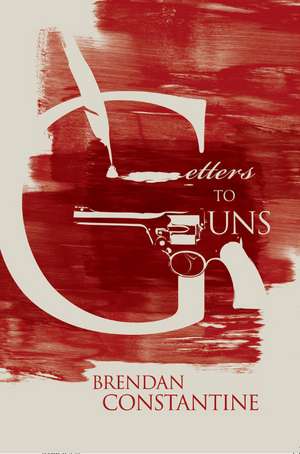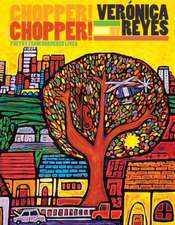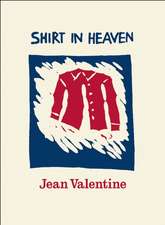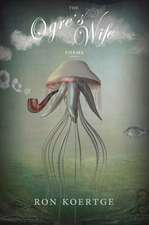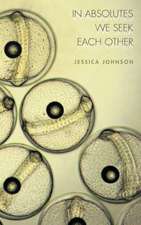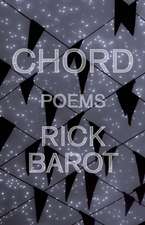Letters to Guns
Autor Brendan Constantineen Limba Engleză Paperback – 14 feb 2009
Letters To Guns represents a collection of poems that examine the para-physical natures of love and history, at times re-imagining both. As the poems progress, eight letters arrive written by non-human addressees (a nightgown, a grove of trees, a wooden spoon, others) at random points over the last 2,200 years. They are messages from home and pleas for understanding, warnings and promises of change. These in turn ignite other poems and themes which anticipate the next arrival. Taken together, the letters form an armature, a living skeleton fleshed by real and metaphenomenal experience. Throughout, a variety of styles appear and no single approach to poetry pervades. Singly, these poems should challenge and entertain. As a group they must transform and evolve our experience of sitting down with a book of poems.
Preț: 91.33 lei
Nou
Puncte Express: 137
Preț estimativ în valută:
17.48€ • 18.30$ • 14.46£
17.48€ • 18.30$ • 14.46£
Carte disponibilă
Livrare economică 17-31 martie
Preluare comenzi: 021 569.72.76
Specificații
ISBN-13: 9781597091381
ISBN-10: 1597091383
Pagini: 80
Dimensiuni: 152 x 229 x 10 mm
Greutate: 0.14 kg
Ediția:1
Editura: Red Hen Press
Colecția Red Hen Press
ISBN-10: 1597091383
Pagini: 80
Dimensiuni: 152 x 229 x 10 mm
Greutate: 0.14 kg
Ediția:1
Editura: Red Hen Press
Colecția Red Hen Press
Recenzii
“Brendan Constantine’s is one of the most astonishing poets to come from over from America. His work is informed by great empathy and technical skill, hysterical wit and painful sensitivity. He possesses a wholly original style, never resting on a single means of creating poetry. No two poems are remotely alike and all are captivating. We wish we could keep him here!”
Literary London Magazine
“Brendan Constantine is a whirlwind of a performer. He has a sure sense of the absurd, and a comedian's timing. I have been wowed by Brendan more times than I can count. He is one of my favorite SoCal poets; I see him every chance I get, and I am never disappointed.”
G. Murray Thomas
Poetic Diversity
“ Brendan Constantine is a poet’s poet. He sees life through a unique prism: at once lucid, elegant, and deeply humanistic.”
Julia Cameron
International best selling author of The Artist’s Way
“Brendan Constantine is poised to be a major force in Southern California poetry in the next millennia. His work combines hip sensibilities, emotional resonance, humor and keen intellect. I cannot recommend him highly enough.”
Laurel Ann Bogen
Poet
“Constantine is one of the finest performers in the [poetry] scene. I am amazed by the brilliant word pictures that flash in and out of his dream logic. The abstract melodies and the primitive rhythms in his poetry. The raw emotional vulnerability of his performance work. It is obvious that Constantine is the real thing.”
Daniel McGinn
OC Weekly
“Brendan Constantine is a strange, strange man, and his poetry is even stranger. There is a manic surrealism engulfing the characters who populate his poems. He is clearly odd, but he’s also brilliant. It’s hysterical that he can title a poem Itsy Bitsy Teeny Weeny Photograph of Mussolini and get away with it. Behind the biting wit and the silliness are our miseries - and a world that is often stark raving mad.”
Victor Infante
OC Weekly
“Brendan Constantine landed on the moon all by himself. A national holiday!”
Scott Wannberg
Poet
"Tell me what you know," and Brendan Constantine will offer you something you don't know, in his astonishing debut book, Letters To Guns. Not since James Tate have we seen a poet so inventive or voracious in topic, in spirit and in imagination. Embracing a wide range of diction, Constantine's poetry bears live witness to what Magritte once called the "symbolic decline of society" within a world seen as a "defiance of common sense." Here, like Kafka's aesthetic shock and like the humor found in art's Dada movement, this book reminds us we are both spectator and accomplice. With unforeseen affinities between character and object, reality and dream, history and the present tense, Constantine's personified 'letters,' awaken surprise with exciting tightrope transition. Letters To Guns accomplishes beauty and despair where stars hold "each other at gunpoint," where the paradoxical is nothing less than irresistible.
No virus found in this incoming message.
Elena Karina Byrne
Author of The Flammable Bird & MASQUE
No virus found in this incoming message.
Elena Karina Byrne
Author of The Flammable Bird & MASQUE
In the hands of Brendan Constantine poetry is a weapon. That much is&n
Notă biografică
Brendan Constantine was born in Los Angeles and grew up there, the second child of two working actors. His parents placed great value on the arts, going so far as to name him for Irish playwright Brendan Behan. Before pursuing his MFA degree at Vermont college Constantine had already toured the US and Europe, published extensively, and been finalist for three major poetry awards.
His work has appeared in numerous journals, most notably Ploughshares, The Los Angeles Review, Artlife, The Cortland Review, The Cider Press Review, Directions, RUNES, StellaZine and LA Times Best-seller The Underground Guide To Los Angeles. His first official book-length collection, Letters To Guns, is due out this Spring from RedHen Press.
He is the creator of Industrial Poetry, a workshop for adults and teens struggling withwriter’s block, and is currently poet in residence at both the Windward School in westLos Angeles and the Idyllwild Arts Summer Youth Writing program in IdyllwildCalifornia.
A regular participant in both the Los Angeles and Orange County Poetry Festivals,Brendan has enjoyed an active role in southern California’s poetry communities. He is athree time finalist for the National Poetry Series and in 2002 was nominated by thePoetry Super Highway for poet laureate of the state of California.
There is no single approach to poetry in Constantine’s view, no school of style. In arecent interview with G. Murray Thomas of Next Magazine, Constantine says, “Everypoem is different. Every poem requires something different from its poet. When I thinkof it, I imagine that the poem exists as a complete but invisible impulse, an entity justoutside our heads, spinning slowly or quickly in the air, until it is translated into somephysical arrangement. If we get it right, it allows itself to be unspooled onto the page.Every poet is thus a translator charged with re-expressing what the phenomenal world hasalready expressed to us.”
For Constantine there are no set means for this translation and there cannot be so long as our language continues to change. A poem may require that you carefully count out its rhythms and break its lines after six beats. Or it may need you to let it move everywhere and run on for pages regardless of meter. It may be whispered or shouted or only read silently in one place at one time. It may stack itself like a list or lay down in a paragraph. “When we argue the legitimacy of one form before another we have likely hit a wall creatively and begun to discriminate out of fear.”
His work has appeared in numerous journals, most notably Ploughshares, The Los Angeles Review, Artlife, The Cortland Review, The Cider Press Review, Directions, RUNES, StellaZine and LA Times Best-seller The Underground Guide To Los Angeles. His first official book-length collection, Letters To Guns, is due out this Spring from RedHen Press.
He is the creator of Industrial Poetry, a workshop for adults and teens struggling withwriter’s block, and is currently poet in residence at both the Windward School in westLos Angeles and the Idyllwild Arts Summer Youth Writing program in IdyllwildCalifornia.
A regular participant in both the Los Angeles and Orange County Poetry Festivals,Brendan has enjoyed an active role in southern California’s poetry communities. He is athree time finalist for the National Poetry Series and in 2002 was nominated by thePoetry Super Highway for poet laureate of the state of California.
There is no single approach to poetry in Constantine’s view, no school of style. In arecent interview with G. Murray Thomas of Next Magazine, Constantine says, “Everypoem is different. Every poem requires something different from its poet. When I thinkof it, I imagine that the poem exists as a complete but invisible impulse, an entity justoutside our heads, spinning slowly or quickly in the air, until it is translated into somephysical arrangement. If we get it right, it allows itself to be unspooled onto the page.Every poet is thus a translator charged with re-expressing what the phenomenal world hasalready expressed to us.”
For Constantine there are no set means for this translation and there cannot be so long as our language continues to change. A poem may require that you carefully count out its rhythms and break its lines after six beats. Or it may need you to let it move everywhere and run on for pages regardless of meter. It may be whispered or shouted or only read silently in one place at one time. It may stack itself like a list or lay down in a paragraph. “When we argue the legitimacy of one form before another we have likely hit a wall creatively and begun to discriminate out of fear.”
